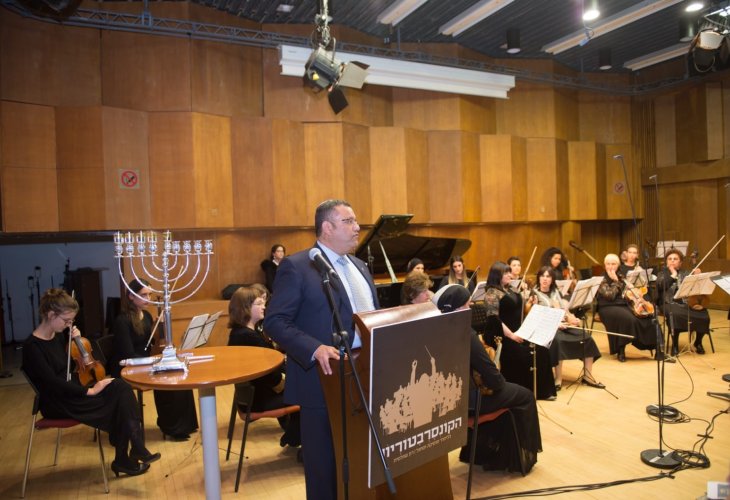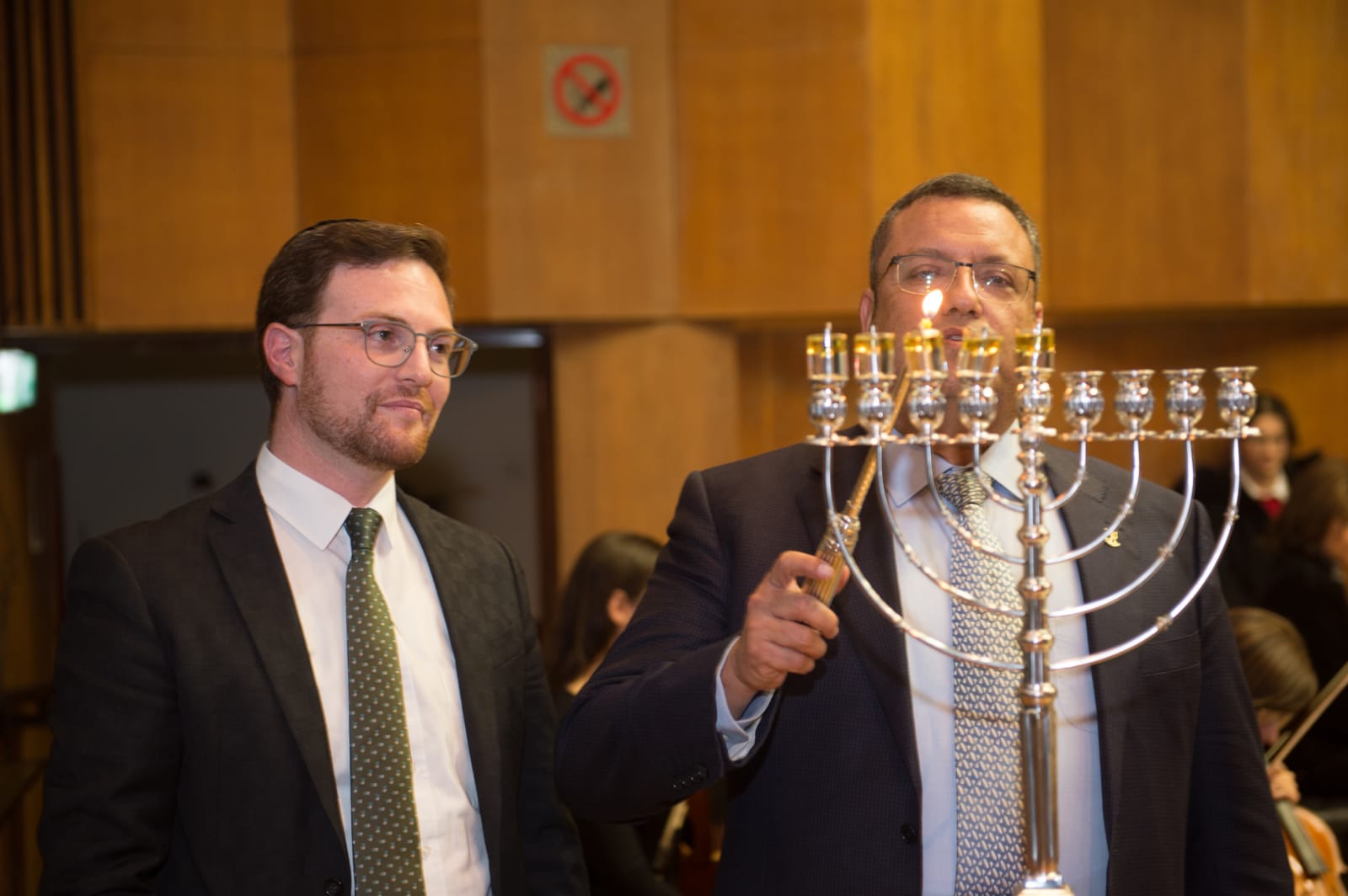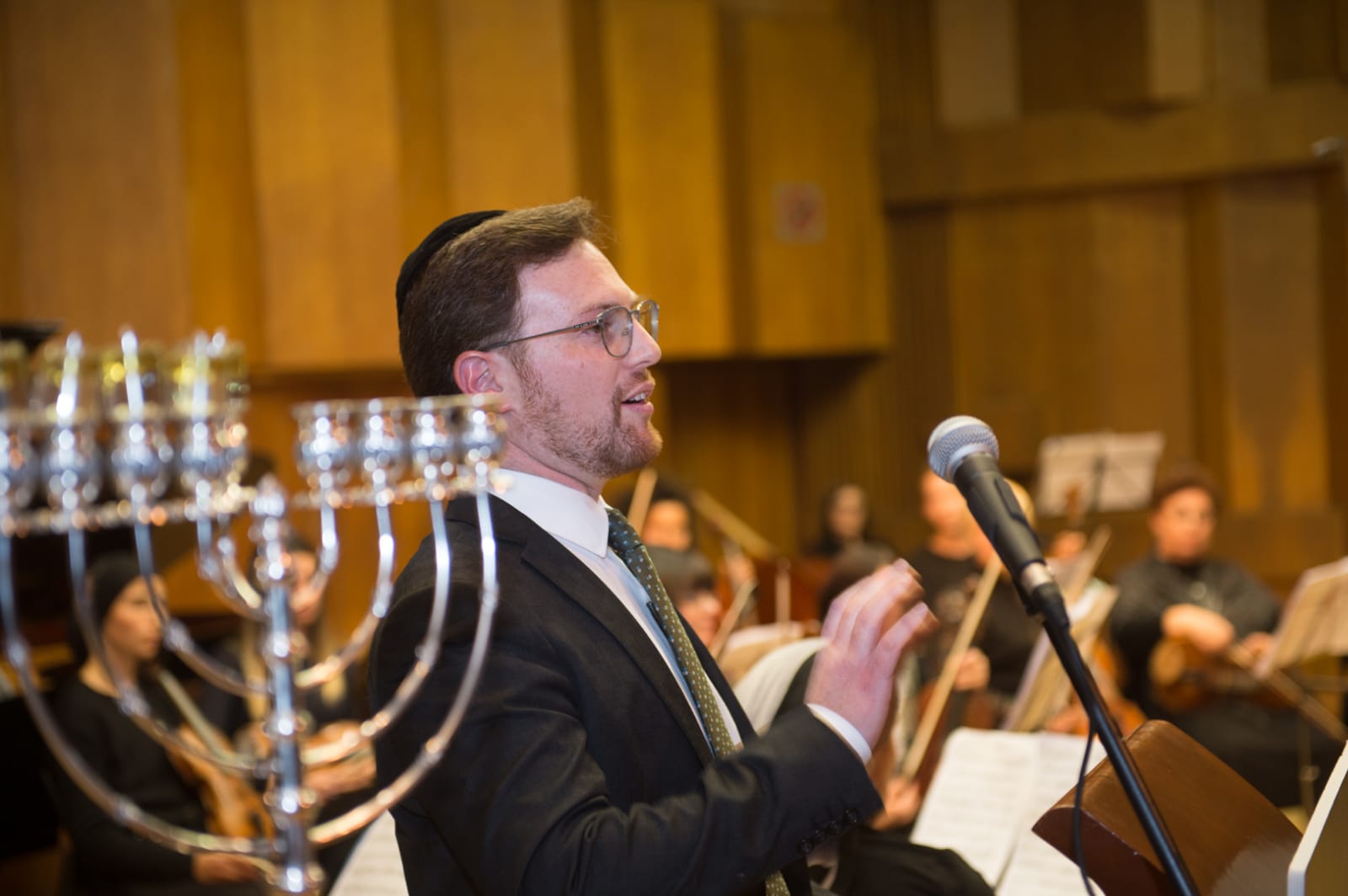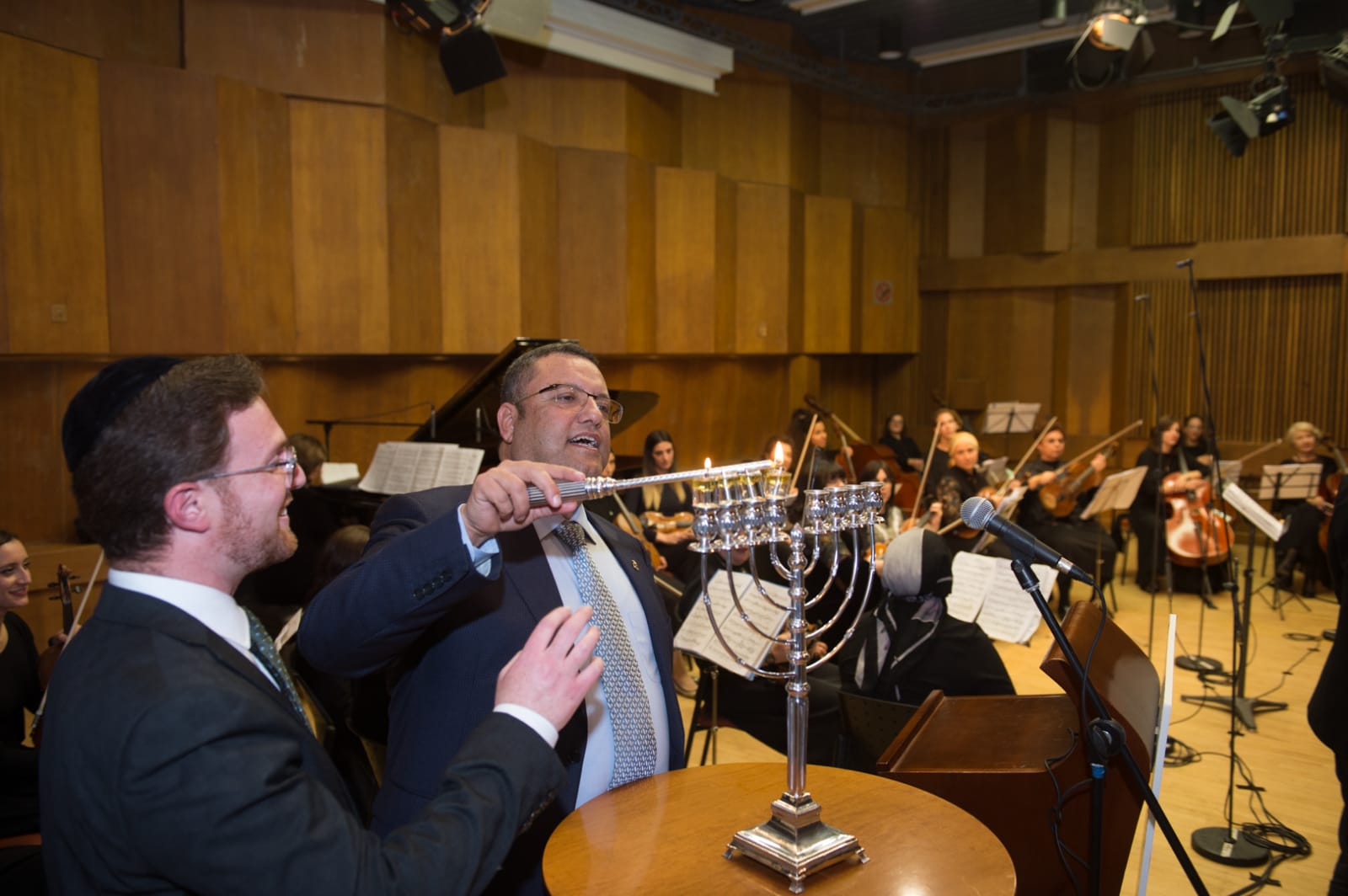Cultural Pioneers: "Haredi Girls Also Need to Know How to Play Music; It Enriches Their World"
The first Haredi conservatory 'Ron Shulamit' in Jerusalem holds special concerts, trains students in musical instruments, and turns some into degree-holding teachers. Ben-Zion Hasid, CEO of Ron Shulamit, states: "Music studies build the character of the students."
 Photo: Ariel Ohana, from a Ron Shulamit concert held recently
Photo: Ariel Ohana, from a Ron Shulamit concert held recently"There isn't enough awareness of Jewish culture," says Ben-Zion Hasid, CEO of the 'Ron Shulamit' Association, which operates the first Haredi branch of the legendary conservatory. "People mistakenly think that entertainment is culture. We undertake educational actions to develop more awareness of culture." Hasid clarifies: "We also aim to eliminate the perception that the Haredi community, which lives within itself, is supposedly against culture. This is simply not true."
Hasid is the son of the famous pianist Aryeh Hasid, who helped establish the Haredi branch in the mid-1980s. Back then, it was a pioneering initiative that created a cultural bridge for the Haredi world. Since then, it has operated as a fully Haredi educational institution, accompanied by close halachic supervision. The girls learn to play Jewish compositions alongside classical works. The age range of the conservatory's female students starts from age four and goes up to 67. According to Hasid, girls who study at the conservatory not only enrich their inner world: "They are given the opportunity to express and channel their feelings. Music studies become a tool that builds the child's character." Therefore, he notes, some large Haredi families make great efforts to ensure their daughters learn to play a musical instrument. "Some families are in a challenging socio-economic position," he explains, "The parents understand that this is a psychological need, so it is very important to them that their daughter learns."

Hasid relies on studies that confirm the hypotheses that music education helps with attention and concentration problems, hyperactivity, emotional issues, low self-esteem, prevention of diseases like Alzheimer's, and more. "There is almost no field it does not touch. On the emotional and personal level, it builds character. It is a whole world that fills a person and allows them to express themselves and their emotions. When my father is sad or happy, he goes to play the piano. It is a tool that allows him to have a dialogue about what he feels. It lets him 'disassemble' the emotions."
About 13 years ago, a branch of Levinsky College of Education was established at 'Ron Shulamit', where Haredi girls can earn a bachelor's degree in music education. "The level of studies is very high," explains Hasid, "It requires years of investment, and several days of study per week. Over time, studies become a central part of the girl's or child's life. The studies of the younger girls are less intensive - since they learn in an easier framework. We expose them to music in an experiential way before they reach the harder part. Later, we match them with a musical instrument."
"Father Returned to Playing the Piano"
The Ron Shulamit Conservatory - a merger of two music schools - was the first music school in the country. It was established 108 years ago in Jaffa by Shulamit Ruppin, attracting renowned students and teachers from across Europe to study and teach there. Over four decades ago, a branch of the conservatory was established in Jerusalem, where it continues to operate in the Har Nof and Beit HaKerem neighborhoods. The Haredi branch was founded by the outgoing CEO of the association, Aryeh Hasid, Ben-Zion’s father, a pianist, and educator originally from Moscow. Hasid the father retired about two years ago, at the age of 69.
Encouraged by Rabbi Nissim Karelitz, he founded the Haredi branch for Beit Yaakov girls in Har Nof neighborhood in 1985. By doing so, the first conservatory became a pioneer globally in teaching classical music to Haredi children. About three weeks ago, another Haredi branch opened, this time in Beit Shemesh. The conservatory is currently managed by Dr. Uri Brenner - a Haredi composer and pianist. The administrative side of the institution is run by Ben-Zion, the son.
Hasid (34), married and father of five children, resides in Beit Shemesh. Although he learned to play piano as a child, he, the son of a pianist, did not continue his studies. "Back then, it wasn’t so common," he recalls, "The friends didn’t really support it, and so I stopped. Nowadays, our concept at the conservatory, supported by Rabbi Nissim Karelitz and Rabbi Asher Weiss’s approval and recommendation, is that boys up to age 8 can play music professionally. Beyond that, they should be available for Torah study. Music is a vast and complete world that takes up a lot of a person's life. There is no place for both professional Torah study and music study."
Ben-Zion was educated by his father. After marriage, he lived in central Israel, then moved to Berlin, Germany, on a mission for a Jewish school. "In my recent years there, I established an online school where Jewish children from across Germany learned Hebrew and about tradition and festivals. It was successful. We used to hold a long weekend meeting with the children and parents twice a year. About two years ago, when my father retired, I returned to Israel and replaced him in his role."
His father now conducts workshops for graduates, enjoying the opportunity to play without dealing with bureaucracy: "My father is happy that the place is successful. He’s proud of it. I consult with him a lot, he has experience and wisdom. He always said he was closest to music but wasn’t there - because he dealt with management. Now he can play, so he is happy. Besides, he continues to teach when I invite him to workshops for graduate girls."

Sacrificing for Their Daughters to Learn
The image of music studies is elitist. Among other things, it’s based on the fact that the studies are relatively expensive, with monthly costs that not every family can afford. "It’s true that music studies aren’t cheap," admits Hasid, "though it depends on which musical instrument we’re talking about. Generally, the price is high for an average large family, but it’s actually considered low compared to other conservatories. Furthermore, let’s not forget that the learning is individual and of high level, with constant activity."
"Additionally, there are group auxiliary studies, where theory and practice are taught. Students participate in a choir and orchestra, or ensemble, or both. Every year master classes with leading artists from Israel and abroad are held at the conservatory. There are advanced students who come daily to practice or practice at home. Beginners come one or two days a week. We try to offer discounts based on the family's socio-economic status. Yes – we know it’s not easy for parents - and we definitely face this challenge. We have students from large families, and their parents don’t have money for luxuries, but since they understand how important it is for their daughter, they truly sacrifice for studies. They know how many emotional, social, motor, and behavioral problems they save by doing this, so they find a solution for their daughter to attend. There are graduate students who work to finance their studies. My father always notes that from the study cycles from 30 years ago to today, we see the results - the students married true Torah scholars and built exemplary homes for the whole of Israel."
"Let’s not forget that boys have a religious framework that enriches their spiritual world, occupying a central part of their lives. The women support their husbands, which is right and beautiful, but they also need a place that allows them to express themselves. This is exactly what music studies do. When a girl learns music, it fills her inner world with content; she has a place to channel her feelings, she builds herself truly. It revives and sustains her. It’s what gives strength and power to support her husband and raise the children to the Torah. Most girls don’t study for the profession; that’s not the aim, although those studying for a music degree later find work teaching music. We assist them through the placement department established by the conservatory, which currently boasts a 90% placement rate."

Raising Awareness to Culture
About a month ago, a 'Ron Shulamit' branch opened in Beit Shemesh. "The response is positive," says Hasid, "We started with over 40 students after screening, and for now, we’ve only opened a few tracks. We aim to grow consistently. We enroll students from the very best Haredi seminaries, precisely because the principals know that the study is supervised and in accordance with halacha. On this issue, there are no compromises. That’s why we have students from different Hasidic sects, even from Mea Shearim, as well as daughters of well-known rabbis and Torah giants."
What place does culture have in the Haredi-Jewish world?
"There is a rich Jewish culture, but it doesn’t have enough space. Judaism is perhaps the greatest and most powerful source of culture, but currently, there’s not enough awareness of culture. People think entertainment is culture, but it’s not. Culture is something deeper. Music, for instance, is very spiritual – the singing and playing of the Levites were among the commandments imposed on the Levites during the existence of the Temple. We take educational actions to develop more awareness of culture. We also aim to eradicate the perception that the Haredi public, living within itself, is supposedly against culture. This is simply not true. For evidence, you can see the flourishing of art education institutions among the Haredi public and the support of Torah giants for the matter. Of course, as long as everything is conducted according to our perspective - a pure Haredi perspective."

